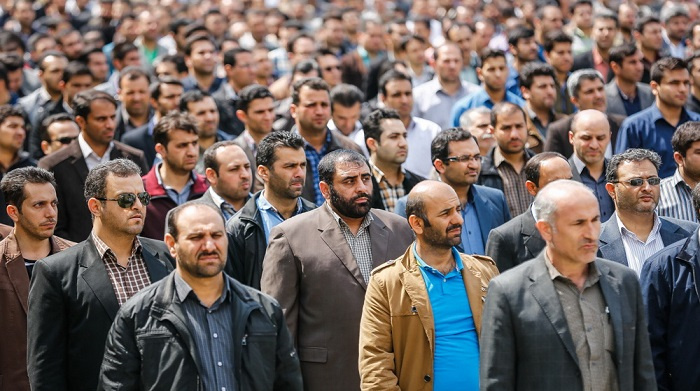Secret Moral Security Police Mystifies People in Tehran

Tehran’s morality police are now endowed with an auxiliary secret force seven thousand deep. The police department of the capital city of Tehran held a ceremony on Monday, April 18 to launch a new mission assigned to some seven thousand male and female police officers who will specialize in ‘harassment, noise pollution, hijab unveilings and automobile stunts’ in the city’s streets and highways. Tehran’s Police Chief, Brigadier General Hossein Sajedinia, told reporters the plainclothes force, a subdivision of the moral security police, would report the offenders’ car plate numbers to the headquarters through an SMS system and they will be contacted and asked to go to the police by a determined deadline. “The plan is an initative by Tehran Police and other districts and provinces are free to adopt the solution,” Sajedinia said. The ceremony that celebrated the beginning of crackdowns on what is seen as social oddities and abnormalities did not come short of the outlandish itself. The faces of at least one percent of the so-called secret force agents were out for identification at the very beginning as online and print media were allowed to publish photos of them standing in lines listening to their commander during the ceremony.
The complex power structure behind the police in Iran is difficult to decipher, as it has been a platform for promises of reform in presidential campaigns and at the same time seems to be working mostly at the disposal of principlists. Iran’s Supreme Leader appoints the country’s Police Chief usually based on a list of generals proposed by the Interior Minister. The police however work under the interior ministry. Mahmoud Ahmadinejad and Hassan Rouhani, under whose terms the plan came to live and survived, have both criticized the morality police initiative as an incapable tool for mending the oddities and respecting civil rights at the same time.
When asked about the secret police campaign in a press conference held at the end of his provincial visit to Semnan, Hassan Rouhani said on Wednesday “some plans are implemented by the administration while other measures concern apparatus such the judiciary”. He advocated more cultural work in lieu of such campaigns. “We should all try and work so hard in the cultural sphere that an issue with a cultural solution be not resolved in other ways,” he added. Elsewhere in his emblematic comments, Rouhani implicitly expressed his administration’s impotence: “The administration is committed to its promises in this regard and has used its potentials to create a feeling of security for the people whenever necessary,” he reiterated, saying human dignity is prioritized over religion.
However, the campaign seems to have come too far from creating a feeling of security. Ardent adherents of Hijab as well as those who advocate more civil freedoms are expressing contempt over the police campaign, saying it would deteriorate public solidarity, trigger distrust and make vulnerable groups, particularly women, feel less safe. They point, jokingly, that women can no longer distinguish men with roving eyes from the secret police whereas many believe the plan will lead to manipulations by bailiff or unauthorized abusers.
A film called Gashte Ershad, a social comedy directed by Saeed Soheili, was inspired by such popularly-believed abuses, featuring the life of three downtown guys who live on money they obtain by picking on young boys and girls in the name of the morality police. The film premiered in 2012, but was soon out from many theaters as Ansar-e-Hezbollah, a powerful conservative group known to be plainclothes themselves, orchestrated street protests against the film. Soheili has recently announced that a sequel is awaiting permit from the Culture Ministry to start its post-production with the same cast.
The recent move by the morality police is said to be a reaction to a recently developed smartphone application, Gershad, that allows users to mark spots on the Tehran city map where the morality police patrol units are located, in order to help potential targets avoid those areas. Others say the move is a revenge by the principlists on the people of Tehran who vote-blocked from the parliament all the principlist candidates running from Tehran in a recent election. Another intention behind the plan is believed to expose the Rouhani administration’s inability to enforce its campaign promises and disappoint the public in a year that will end months before an election that could lead to Rouhani’s reelection.

